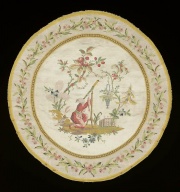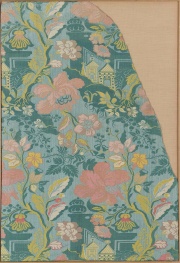Difference between revisions of "Brocade"
Jump to navigation
Jump to search
(username removed) |
|||
| (3 intermediate revisions by 3 users not shown) | |||
| Line 1: | Line 1: | ||
| − | [[File:51.253-SC54525.jpg|thumb|]] | + | [[File:51.253-SC54525.jpg|thumb|Chair seat<br>MFA# 51.253]] |
== Description == | == Description == | ||
| − | A heavy fabric, with an elaborate, raised design interwoven on a [ | + | A heavy fabric, with an elaborate, raised design interwoven on a [[satin weave|satin]] or [[twill weave|twill]] weave background. Brocade originated in France and was usually made with a [[jacquard]] weaving mechanism. The embossed fabric, usually made from [[silk]] or [[cotton]], can have [[gold]] or [[silver]] interlaced threads. It is used for upholstery, draperies, and wall coverings. |
| + | |||
| + | [[File:96.363-SC57907.jpg|thumb|French brocade fragment<br>MFA# 96.363]] | ||
| − | |||
== Synonyms and Related Terms == | == Synonyms and Related Terms == | ||
| Line 12: | Line 13: | ||
<gallery> | <gallery> | ||
| − | File:21. | + | File:21.246_brocade_overall.jpg|Japanese silk brocade with gold thread overall |
| − | File:21. | + | File:21.246_brocade_det.jpg|Japanese silk brocade with gold thread detail |
| − | File:21. | + | File:21.246_brocade_det_obverse.jpg|Japanese silk brocade with gold thread detail on obverse |
</gallery> | </gallery> | ||
| − | + | ==Resources and Citations== | |
| − | == | ||
* Hermann Kuhn, ''Conservation and Restoration of Works of Art and Antiquities'', Butterworths, London, 1986 | * Hermann Kuhn, ''Conservation and Restoration of Works of Art and Antiquities'', Butterworths, London, 1986 | ||
| Line 30: | Line 30: | ||
* ''The American Heritage Dictionary'' or ''Encarta'', via Microsoft Bookshelf 98, Microsoft Corp., 1998 | * ''The American Heritage Dictionary'' or ''Encarta'', via Microsoft Bookshelf 98, Microsoft Corp., 1998 | ||
| − | * ''Encyclopedia Britannica'', http://www.britannica.com Comment: "Brocade." | + | * ''Encyclopedia Britannica'', http://www.britannica.com Comment: "Brocade." Accessed 10 Aug. 2004. |
* Art and Architecture Thesaurus Online, http://www.getty.edu/research/tools/vocabulary/aat/, J. Paul Getty Trust, Los Angeles, 2000 | * Art and Architecture Thesaurus Online, http://www.getty.edu/research/tools/vocabulary/aat/, J. Paul Getty Trust, Los Angeles, 2000 | ||
| Line 36: | Line 36: | ||
* Edward Reich, Carlton J. Siegler, ''Consumer Goods: How to Know and Use Them'', American Book Company, New York City, 1937 | * Edward Reich, Carlton J. Siegler, ''Consumer Goods: How to Know and Use Them'', American Book Company, New York City, 1937 | ||
| − | * Website | + | * Website: www.fabrics.net |
[[Category:Materials database]] | [[Category:Materials database]] | ||
Latest revision as of 11:24, 10 May 2022
Description
A heavy fabric, with an elaborate, raised design interwoven on a satin or twill weave background. Brocade originated in France and was usually made with a Jacquard weaving mechanism. The embossed fabric, usually made from Silk or Cotton, can have Gold or Silver interlaced threads. It is used for upholstery, draperies, and wall coverings.
Synonyms and Related Terms
brocado (Esp.); brocart (Fr.); Brokaat (Ned); lamé; brocatelle;
Additional Images
Resources and Citations
- Hermann Kuhn, Conservation and Restoration of Works of Art and Antiquities, Butterworths, London, 1986
- Hoechst Celanese Corporation, Dictionary of Fiber & Textile Technology (older version called Man-made Fiber and Textile Dictionary, 1965), Hoechst Celanese Corporation, Charlotte NC, 1990
- Matt Roberts, Don Etherington, Bookbinding and the Conservation of Books: a Dictionary of Descriptive Terminology, U.S. Government Printing Office, Washington DC, 1982
- Random House, Webster's Encyclopedic Unabridged Dictionary of the English Language, Grammercy Book, New York, 1997
- The American Heritage Dictionary or Encarta, via Microsoft Bookshelf 98, Microsoft Corp., 1998
- Encyclopedia Britannica, http://www.britannica.com Comment: "Brocade." Accessed 10 Aug. 2004.
- Art and Architecture Thesaurus Online, http://www.getty.edu/research/tools/vocabulary/aat/, J. Paul Getty Trust, Los Angeles, 2000
- Edward Reich, Carlton J. Siegler, Consumer Goods: How to Know and Use Them, American Book Company, New York City, 1937
- Website: www.fabrics.net




